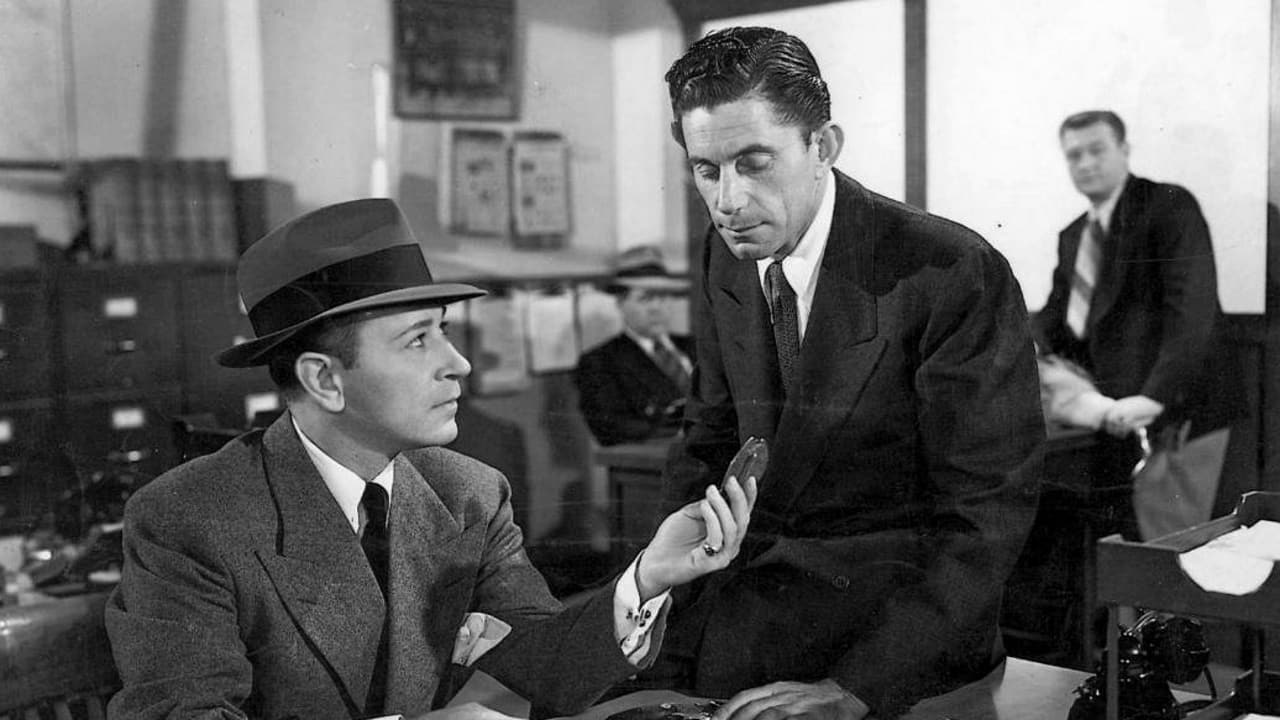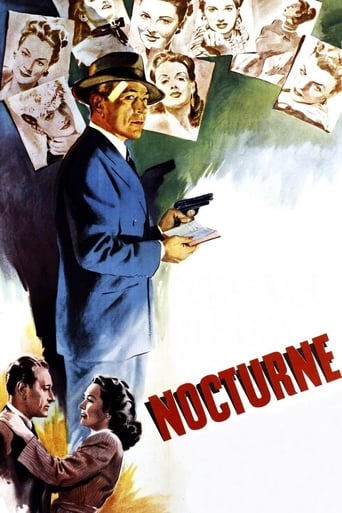

As most Fans of Film-Noir are aware, making a "pure" Noir is difficult at best. There seems to be a penchant to include disappointing and diverting Scenes and attributes not befitting the most elusive and interesting of Genres. Here we have an opening Reel much of which could be used as exclamations and examples of Film-Noir at its most compelling. But alas, only some snippets and occasional "bright" spots remain. Some snappy Dialog, lighting, Off-Studio L.A. locations, and brutal Violence are overshadowed by some Matronly Comedy relief, a hollow and forced Lead Performance, and a smarmy Ending Exit that hardly is Noir.There are enough elements here that keep it from sinking under its own convoluted weight and veering too far from Noir, that make it watchable. It is a minor entry in the Pantheon with some things that are intriguing, but still contains enough exacerbations that render this, for the most part, unfulfilled.
... View MoreEven though the death of an epicene Cole Porter like composer played memorably by Edward Ashley at the beginning of Nocturne is ruled a suicide, Detective George Raft ain't buying it. The man has a wall full of headshot portraits of various women he's discarded over the years and anyone who loves them and leaves them like that is bound to make some enemies. The answer lies among those women, all of whom Ashley called Dolores.George Raft was always best in noir and gangster films whether he was the good guy or the bad. He was limited in his range, but within that range no one was better.A pair of sisters provide part of the answer. Both Lynn Bari and Virginia Huston were involved with Ashley at some point. But they're only part of the puzzle.One of the best things about Nocturne is about how the killer had the police lab people draw the wrong conclusions about the murder. It's why they label Ashley's death a suicide.If Nocturne were made today, Ashley's character would be openly gay and those pictures on the wall would be rent boys. Might make a great story for the Donald Strachey gay detective books and films that Chad Allen has starred in.A very clever noir film, let's see a gay remake of this.
... View MoreRaft is a police detective investigating an apparent suicide. A reprobate composer of pop songs is found with "a bullet in his noggin," a revolver in his hand, and power marks all over him. The cops are satisfied but Raft is compelled to wonder, as Lieutenant Columbo would have, why the composer sent his butler out for some bicarbonate of soda, and why he stopped writing his next song in mid-note, or rather mid-shot. Raft pushes the investigation too far, smashing up a couple of rooms and flattening one or two surly characters, and hustling one of the composer's recent lady friends until, as it must to all responsible cops, the time comes when he must forfeit his badge and gun.The dialog has a couple of neat touches, along the lines of: "I heard you were busting up some furniture but from the looks of you I'd say the furniture won." And when Raft appears in bandages, his shirt blotched with blood, after a fight with some pituitary case, someone remarks, "I see you've been painting the town red." Raft: "The other way around." Raft looks good, with his cast-iron features and neat fedora. Lynn Bari, the girl in the picture, is one of those many B-list actresses that never got very far -- Mara Corday, Faith Domergue. No great loss to cinematic art.The film itself is routine. Raft encounters one suspect after another, the pursuit punctuated by bouts of violence. Half-way through I figured the killer was either the piano player or the blond -- otherwise why were they getting so much screen time in unimportant roles? But I was only half right, or two times right, depending on the theory of numbers you subscribe to.
... View More(Some Spoilers) Popular Hollywood song writer Keith Vincent, Edward Ashley, is found dead with a bullet at his head at his luxury home in the Hollywood Hills. Checking out the scene the police come to the conclusion that Vincent killed himself after the forensics results come in showing powder burns on both his hand and head and no sign of a struggle but LAPD Det. Warner, George Raft, has other ideas about Vincent's death; he was murdered. It's apparent that Vincent was murdered when a piece of music he was composing was found on his piano unfinished. The piece was dedicated to some woman called Dolores. The fact that Vincent was, according to his live-in maid and houseboy, very upbeat the day he was found dead convinced Det. Warner that his death wasn't a suicide. On the wall of Vincent's living-room there's a number of large photos of women who were in one way or another involved with Vincent and checking out who they are Warner finds out that Vincent had a habit of calling any woman that he knew Dolores! There was also a photo that was missing and that may have been that of the person who murdered Keith Vincent.Going through the nightlife scene of post WWII L.A Det. Warner tracks down the killer who murdered Kieth Vincent but only after he gets his head broken and his ribs bruised. Warner also falls in love with the #1 suspect in Vincent murder the woman who's photo was mysterious missing from Vincent's living-room wall Frances Ransom, Lynn Bari. Det. Warner connects Vincent with both Frances' younger sister Carol Page, Virgina Huston, and the piano player at the nightclub "The Keyboard", where Carol is a singer and the star attraction, Ned "Fingers" Ford,Joseph Pevney, the club's pianist.Det. Warner finds both Carol and "Fingers" very uncomfortable when he asks them about Vincent's unfinished piece of music and later "Finger's" admits to him that he in fact was a collaborator in a number of Vincent's songs. As Det. Warner gets closer to the truth about Vincent's death, or murder his life becomes endangered when he's attacked by one of the bouncer's or muscle-men Eric Torp, Ben Hoffman,who works at "The Keyboard" nightclub ending up in the hospital. The photographer Charles Shawn, John Banner,who took the pictures of the Vincent women panics and tries to get in touch with Warner about the truth of why he was murdered and who did it. When Warner gets to his studio he finds Shawn dead hanging from the sky window apparently murdered but made to look, like with Vincent, as if he killed himself. Going back to the "Keyboard" nightclub to get some more information out of both Carol and "Fingers, as well as Caorl's sister Frances, Det. Warner is confronted again by the large and brutish Torp. This time Det. Warner puts Torp away with a hot pot of coffee thrown in his face and a steel pipe smashed over his head. A color change threw Det. Warner off to who was responsible for Vincent's murder and with a new photo that Det. Warner uncovered at the Shawn Studio he now knows who's behind Vincent's death and even more why.
... View More